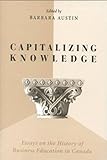Capitalizing Knowledge : Essays on the History of Business Education in Canada / ed. by Barbara Austin.
Material type: TextSeries: HeritagePublisher: Toronto : University of Toronto Press, [2000]Copyright date: ©2000Description: 1 online resource (386 p.)Content type:
TextSeries: HeritagePublisher: Toronto : University of Toronto Press, [2000]Copyright date: ©2000Description: 1 online resource (386 p.)Content type: - 9780802042347
- 9781442672710
- 650/.071/171
- HF1131 .C36 2000eb
- online - DeGruyter
| Item type | Current library | Call number | URL | Status | Notes | Barcode | |
|---|---|---|---|---|---|---|---|
 eBook
eBook
|
Biblioteca "Angelicum" Pont. Univ. S.Tommaso d'Aquino Nuvola online | online - DeGruyter (Browse shelf(Opens below)) | Online access | Not for loan (Accesso limitato) | Accesso per gli utenti autorizzati / Access for authorized users | (dgr)9781442672710 |
restricted access online access with authorization star
http://purl.org/coar/access_right/c_16ec
Interpreting the path of the future is made easier by understanding the past. In light of this adage, "Capitalizing Knowledge" examines the history of Canadian business faculties in their search for professional legitimacy. As the title suggests, this volume is an overview of the development of business schools in Canadian universities. Business faculties have different characteristics; some are noted for generating management research, while others generate interaction with the business community. Some programs are famous for their MBA graduates, others for their undergraduate students. This collection of essays describes the critical events that have defined the character of these faculties and societies of business education in Canada over the course of the twentieth century. Eight universities are profiled, including Queen's, York, and the University of Toronto. In addition, the development of the Administrative Sciences Association of Canada (ASAC) is traced.The first book of its kind, "Capitalizing Knowledge" contains original research by some of the leading Canadian business school academics, who describe how these programs have evolved. The contributors all note the particular importance of organization culture and values in moulding the actions of faculty members. They also highlight the difficulties associated with establishing a body of knowledge in business management and transforming that knowledge to suit ever-changing business organizations and industry at large.
Mode of access: Internet via World Wide Web.
In English.
Description based on online resource; title from PDF title page (publisher's Web site, viewed 01. Nov 2023)


